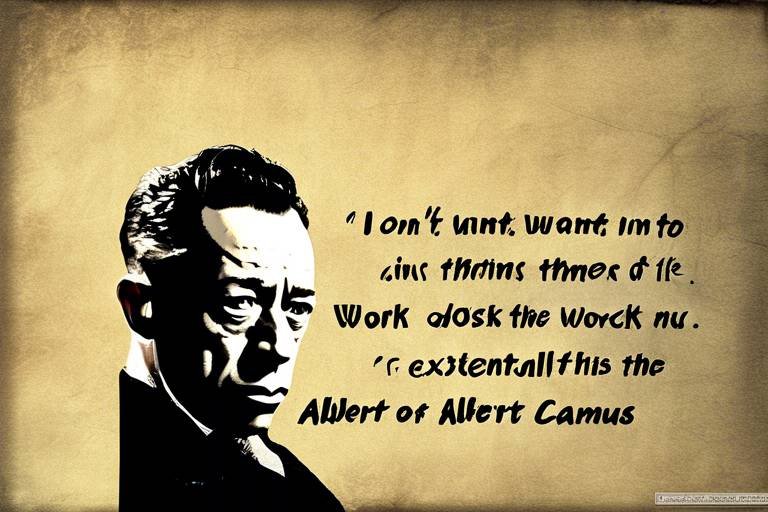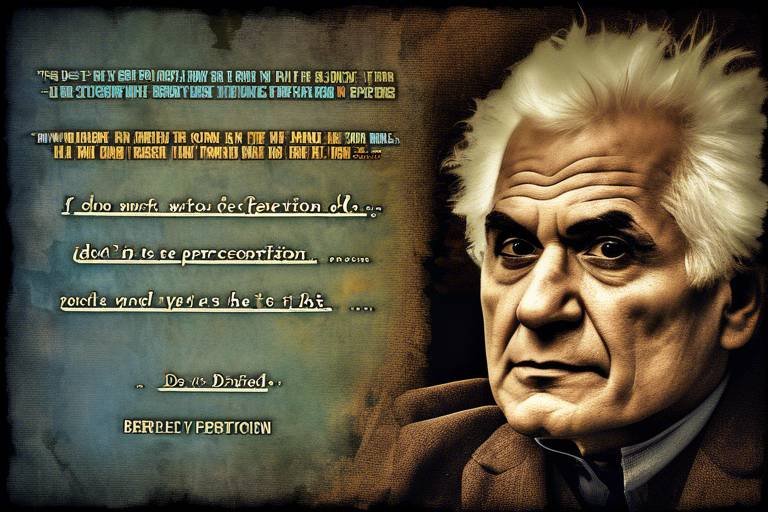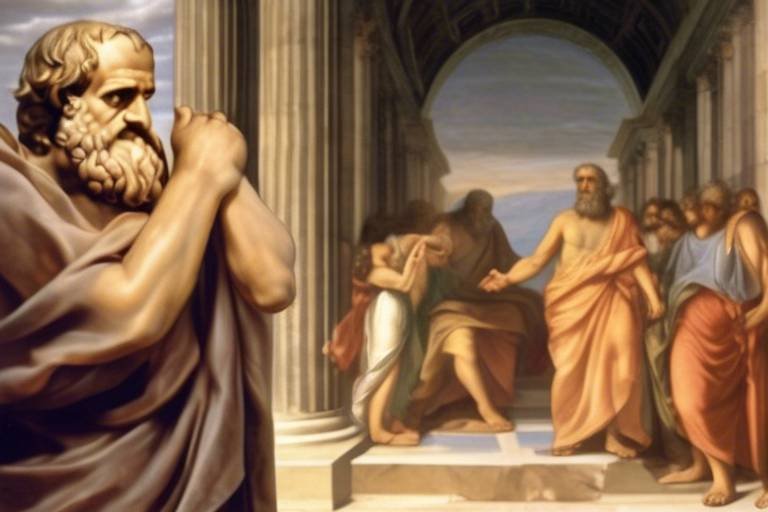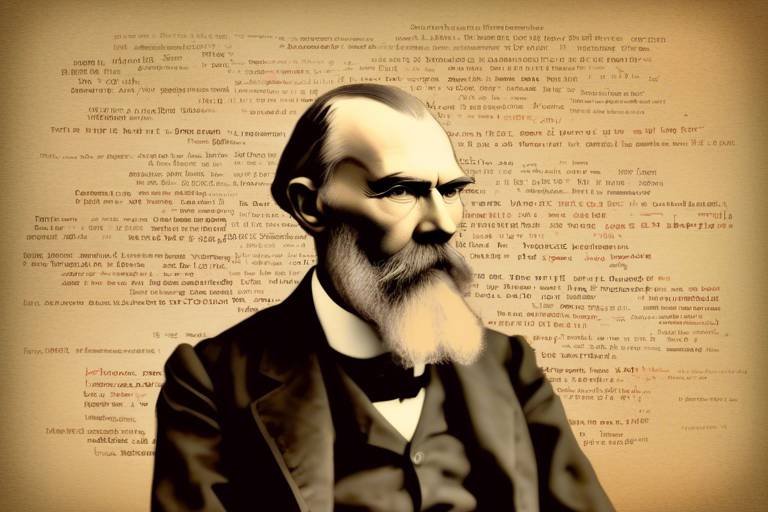Heraclitus - The Philosophy of Flux and Fire
Heraclitus, a pre-Socratic philosopher from Ephesus, is often remembered for his profound and enigmatic insights into the nature of existence. His philosophy is best encapsulated in the famous assertion that "everything flows," a statement that invites us to ponder the very essence of reality. Imagine standing by a river, watching the water rush past; it’s the same river yet entirely different each moment. This metaphor beautifully illustrates Heraclitus's idea of flux, where change is the only constant. In a world where we often seek stability and permanence, Heraclitus challenges us to embrace the dynamic nature of life. His thoughts on the interplay of opposites, the significance of fire, and the nature of reality itself offer a lens through which we can explore our own existence and the universe around us.
One of the most striking features of Heraclitus's philosophy is his use of fire as a central metaphor. Fire, with its dual capacity for destruction and creation, serves as an emblem of transformation. Just as a flame can consume wood, turning it to ashes, it can also provide warmth and light, fostering life. This duality is not merely poetic; it reflects the inherent contradictions within existence. Heraclitus believed that understanding these contradictions is crucial to grasping the essence of reality. In his view, the world is a constant dance of opposites—life and death, harmony and discord, growth and decay—each necessary for the existence of the other. Through this lens, we can begin to appreciate the intricate tapestry of life, where every thread of experience is woven together by the fire of change.
As we delve deeper into Heraclitus's philosophy, we uncover the significance of his concept of the Logos, a rational principle that governs the cosmos. The Logos represents the underlying order amidst chaos, a guiding force that maintains balance in the ever-changing universe. It's akin to the underlying rhythm of a symphony, where each note contributes to a harmonious whole. Heraclitus's insights remind us that while change may seem chaotic, there is a deeper structure to our experiences. By recognizing the Logos, we can better navigate the complexities of life, finding meaning in the flux that surrounds us.
In conclusion, Heraclitus's philosophy of flux and fire invites us to reconsider our perceptions of reality. Rather than viewing change as a threat, he encourages us to embrace it as an essential part of existence. The interplay of opposites, the transformative power of fire, and the guiding principle of the Logos all serve to illuminate the profound truths about our world. As we reflect on his teachings, we may find that the key to understanding our own lives lies in accepting the inevitability of change and recognizing the beauty that arises from the dance of opposites.
- What does Heraclitus mean by "everything flows"?
This phrase emphasizes the idea that change is constant and that nothing remains the same. Just like a river, which is never the same at any two moments, our lives and the world around us are in a state of perpetual flux.
- Why is fire significant in Heraclitus's philosophy?
Fire symbolizes transformation, representing both destruction and creation. It reflects the dynamic nature of reality and the continuous cycle of life and death, illustrating the dual nature of existence.
- What is the Logos in Heraclitus's thought?
The Logos is a rational principle that governs the cosmos, providing order amidst chaos. It represents the underlying structure of reality, helping us understand the unity in change.

The Concept of Flux
Heraclitus famously stated that everything flows, a powerful assertion that encapsulates his belief in the constant state of change that permeates the universe. Imagine standing by a river; you can't step into the same water twice because the water is always moving, always transforming. This metaphor perfectly illustrates Heraclitus's idea of flux, where nothing remains static and everything is in a state of becoming. It's a radical departure from the traditional views that prioritize stability and permanence. In a world where the only constant is change, how do we find our footing?
Heraclitus's philosophy invites us to embrace this fluidity. He believed that understanding flux is essential to grasping the essence of reality. Our lives, much like the river, are marked by a series of transitions—birth, growth, decay, and rebirth. These cycles are not merely events but integral parts of a larger, ever-evolving tapestry. To illustrate this, consider the following points:
- Change is inevitable: Just as seasons shift, so do our circumstances and experiences.
- Adaptation is key: In a world of flux, those who adapt thrive, while those who resist change often find themselves struggling.
- Understanding flux leads to wisdom: By recognizing the transient nature of life, we can cultivate a deeper appreciation for the present moment.
Furthermore, Heraclitus argued that flux is not chaotic but rather follows a certain order, often referred to as the Logos. This rational principle governs the universe, ensuring that even amidst constant change, there is a form of coherence and unity. Think of it as a dance; while the dancers move in different directions, they are still part of a choreographed performance, creating a beautiful and harmonious spectacle.
The implications of this concept are profound. It challenges us to reconsider our perceptions of stability and permanence. We often cling to the idea of a fixed identity or a stable situation, but Heraclitus reminds us that such notions are illusions. The reality we perceive is merely a snapshot in a continuous flow of change. By acknowledging this, we can begin to let go of fear and anxiety associated with the unknown and embrace the beauty of transformation.
In essence, the concept of flux is a call to action. It encourages us to engage with life actively, to flow with the currents rather than resist them. As we navigate through our personal and collective journeys, understanding the nature of flux can empower us to adapt, grow, and ultimately thrive in a world that is perpetually in motion. Are you ready to embrace the river of change?
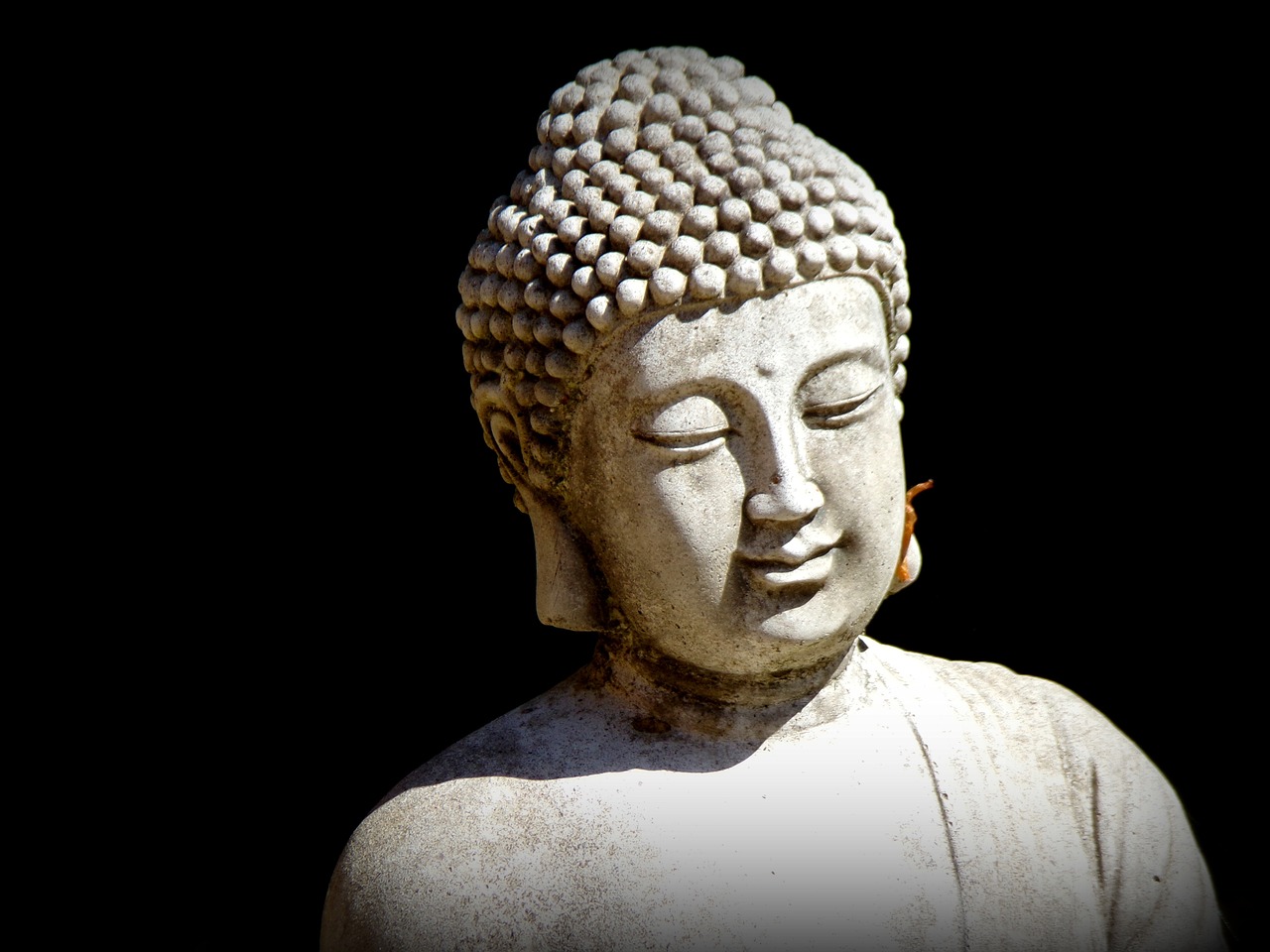
everything flows,
This article explores the profound ideas of Heraclitus, focusing on his concepts of change, the nature of reality, and the interplay of opposites, emphasizing the significance of fire as a metaphor in his philosophy.
Heraclitus famously stated that everything flows, emphasizing the constant state of change in the universe. This idea is not just a philosophical musing; it is a fundamental truth about our existence. Imagine standing by a river, watching the water rush by. You might think that the river is the same as it was a moment ago, but if you look closely, you'll see that every droplet is different. Just as in life, everything is in a state of flux—relationships, emotions, and even our thoughts are constantly evolving. Heraclitus believed that this constant change is what makes life rich and vibrant, like a canvas that is continuously painted over with new colors.
To illustrate this concept further, consider the following points:
- Nature's Cycles: Seasons change, days turn into nights, and life is born only to die and be reborn. This cyclical nature of existence is a testament to Heraclitus's belief that nothing remains static.
- Personal Growth: Just as a caterpillar transforms into a butterfly, we too undergo transformations throughout our lives. These changes shape who we are and how we perceive the world.
- Societal Evolution: Cultures and societies are not immune to change. They adapt, grow, and sometimes even regress, reflecting the dynamic nature of human existence.
Heraclitus's assertion that everything flows invites us to embrace change rather than resist it. Think about the times you faced change—those moments can be daunting, yet they often lead to personal growth and new opportunities. Thus, understanding the nature of flux can empower us to navigate life's uncertainties with grace and resilience. In a world that often feels chaotic, recognizing that change is the only constant can provide a sense of peace and acceptance.
Fire is a central symbol in Heraclitus's philosophy, representing transformation and the dynamic nature of reality. This section examines how fire embodies his ideas and its significance in the context of change.
In Heraclitus's thought, fire symbolizes both destruction and creation. This subsection explores how fire illustrates the dual nature of existence and the continuous cycle of life and death.
Fire not only destroys but also fosters growth and renewal. This part discusses how Heraclitus viewed fire as a force for creativity and transformation in the world.
While fire creates, it also consumes. This section analyzes the destructive side of fire and its relevance to Heraclitus's understanding of conflict and change in life.
Heraclitus believed that opposites are interconnected and necessary for harmony. This subsection investigates how opposing forces contribute to the balance and unity of the cosmos.
Heraclitus's view of reality challenges static perceptions, asserting that reality is ever-changing. This section discusses his insights into the nature of existence and the illusory nature of permanence.
Heraclitus posited that human perception often misrepresents reality. This part explores the distinction between perceived stability and the underlying flux that defines true existence.
The concept of Logos is pivotal in Heraclitus's philosophy, representing the rational principle governing the cosmos. This section examines the significance of Logos in understanding the unity of change.
- What does "everything flows" mean in Heraclitus's philosophy?
It means that all things are in a constant state of change and nothing remains the same.
- Why is fire so significant in Heraclitus's thought?
Fire symbolizes transformation, representing both destruction and creation, highlighting the dynamic nature of reality.
- How does Heraclitus's philosophy relate to modern life?
His ideas encourage us to embrace change and understand that flux is a natural part of existence, helping us navigate life's challenges.

emphasizing the constant state of change in the universe. This section delves into the implications of flux and how it shapes our understanding of existence.
This article explores the profound ideas of Heraclitus, focusing on his concepts of change, the nature of reality, and the interplay of opposites, emphasizing the significance of fire as a metaphor in his philosophy.
Heraclitus famously stated that everything flows, emphasizing the constant state of change in the universe. Imagine standing by a river; you see the water rushing past, yet you can never step into the same water twice. This vivid imagery perfectly encapsulates Heraclitus's philosophy of flux. Everything around us, including our thoughts, emotions, and even the very fabric of the universe, is in a perpetual state of transformation. This notion of flux challenges our traditional understanding of existence, which often seeks stability and permanence. Instead, Heraclitus invites us to embrace the chaos and unpredictability of life, suggesting that change is not just inevitable but essential.
Consider how this idea of flux impacts our daily lives. We often cling to the past, yearning for the days when things seemed simpler or more stable. However, Heraclitus reminds us that stagnation is an illusion. Every moment is a new opportunity for growth and learning. The implications of this philosophy are profound: if we accept that change is the only constant, we can begin to navigate life's challenges with a more open and adaptable mindset. This perspective not only enriches our personal experiences but also influences our interactions with others and the world around us.
Furthermore, the concept of flux extends beyond individual experiences; it shapes our understanding of larger systems, such as nature and society. Just as a river continuously carves its path through the landscape, societal norms and natural ecosystems are also in a state of flux. This dynamic interplay can lead to both conflict and harmony, as different forces vie for balance. In recognizing the fluid nature of existence, we can foster a greater appreciation for the interconnectedness of all things.
In summary, Heraclitus's philosophy of flux encourages us to embrace change as an integral part of life. By understanding that everything is in motion, we can cultivate resilience and adaptability, ultimately leading to a richer, more fulfilling existence. The implications of this perspective are vast, urging us to reconsider our relationship with the world and to find beauty in the ever-changing tapestry of life.
Fire is a central symbol in Heraclitus's philosophy, representing transformation and the dynamic nature of reality. This section examines how fire embodies his ideas and its significance in the context of change.
In Heraclitus's thought, fire symbolizes both destruction and creation. This subsection explores how fire illustrates the dual nature of existence and the continuous cycle of life and death.
Fire not only destroys but also fosters growth and renewal. This part discusses how Heraclitus viewed fire as a force for creativity and transformation in the world.
While fire creates, it also consumes. This section analyzes the destructive side of fire and its relevance to Heraclitus's understanding of conflict and change in life.
Heraclitus believed that opposites are interconnected and necessary for harmony. This subsection investigates how opposing forces contribute to the balance and unity of the cosmos.
Heraclitus's view of reality challenges static perceptions, asserting that reality is ever-changing. This section discusses his insights into the nature of existence and the illusory nature of permanence.
Heraclitus posited that human perception often misrepresents reality. This part explores the distinction between perceived stability and the underlying flux that defines true existence.
The concept of Logos is pivotal in Heraclitus's philosophy, representing the rational principle governing the cosmos. This section examines the significance of Logos in understanding the unity of change.
- What is the main idea of Heraclitus's philosophy?
Heraclitus's philosophy centers around the concept of flux, emphasizing that everything is in a constant state of change. - Why is fire significant in Heraclitus's thought?
Fire represents both destruction and creation, illustrating the dual nature of existence and the transformative power of change. - How does Heraclitus's philosophy apply to modern life?
By accepting change as a constant, we can develop resilience and adaptability, enriching our experiences and interactions.

The Role of Fire
Fire holds a unique and powerful place in the philosophy of Heraclitus, serving as a vital symbol that encapsulates the essence of transformation and the dynamic nature of reality. To Heraclitus, fire is not merely a physical phenomenon; it is a metaphor for life itself. Just as fire consumes and transforms everything in its path, so too does change permeate our existence. The flickering flames remind us that nothing remains static, and everything is subject to the relentless flow of time.
In Heraclitus's worldview, fire represents the constant interplay of creation and destruction. This duality is crucial in understanding how he perceived the universe. Fire is not just a force of annihilation; it is also a catalyst for growth. This idea can be likened to the cycle of seasons—winter may seem harsh and destructive, yet it prepares the ground for the vibrant life of spring. Similarly, fire purges the old to make way for the new, illustrating the profound connection between destruction and renewal.
Moreover, Heraclitus emphasized that fire embodies the principle of change. Just as fire can be both a nurturing warmth and a consuming blaze, the changes we experience in life can be both beneficial and challenging. This duality invites us to embrace the chaos of existence rather than resist it. After all, it is through the trials and tribulations that we often find our greatest strengths and insights. Heraclitus's philosophy encourages us to see fire as a symbol of our own inner transformation, reminding us that we too can rise from the ashes of adversity.
To further illustrate the role of fire in Heraclitus's philosophy, consider the following table that outlines the key aspects of fire as a transformative element:
| Aspect | Destructive Power | Creative Power |
|---|---|---|
| Nature | Consumes and annihilates | Fosters growth and renewal |
| Symbolism | Represents chaos and conflict | Embodies creativity and change |
| Life Cycle | Destruction leads to new beginnings | Transformation leads to evolution |
In essence, the role of fire in Heraclitus's thought serves as a reminder that life is a continuous cycle of opposing forces. Embracing this cycle allows us to navigate the complexities of existence with greater awareness and resilience. Just as fire illuminates the darkness, Heraclitus's insights can guide us through the uncertainties of life, encouraging us to find meaning in the flux that surrounds us.

Fire as a Metaphor
In the realm of Heraclitus’s philosophy, fire is not just a physical element; it is a profound metaphor that embodies the essence of change and transformation. Think about it: fire can both illuminate and consume, creating a powerful analogy for the dual nature of existence. This is where Heraclitus shines, as he suggests that life is a constant dance between creation and destruction. Just like a flame flickers and shifts, so too does our reality evolve and morph over time.
Heraclitus’s perspective invites us to consider how fire illustrates the dynamic interplay of opposites in our lives. It is a vivid reminder that without darkness, we would not appreciate light; without birth, there can be no death. This cyclical nature of existence, represented by fire, highlights the importance of understanding that every end is merely a precursor to a new beginning. As we examine fire's role in his philosophy, we can see how it serves as a bridge between destruction and creation, urging us to embrace the flux of life.
Moreover, fire's transformative power is evident in various aspects of our lives. It can be a catalyst for change, igniting passion and ambition, or it can burn away the old to make way for the new. This duality is essential for growth and renewal. To illustrate this point, let’s consider a few ways fire serves as a metaphor:
- Destruction: Fire consumes everything in its path, much like how certain experiences in life can feel overwhelming and destructive. However, this destruction often clears the way for new opportunities.
- Creation: Just as a forest regenerates after a fire, life often finds a way to flourish after periods of hardship and loss.
- Passion: Fire represents the burning desire within us, driving creativity and innovation, pushing us to pursue our dreams.
In essence, Heraclitus uses fire to remind us that life is not a straight path but rather a series of fluctuations and transformations. It compels us to recognize that every moment is fleeting, and thus, we must cherish the present while remaining open to the inevitable changes that lie ahead. The metaphor of fire encourages us to dance with the flames of life, embracing both the light and the heat, understanding that each flicker represents a new possibility waiting to unfold.

The Creative Aspect of Fire
When we think about fire, the first images that often come to mind are those of destruction and chaos. However, Heraclitus challenges us to look deeper and recognize fire's transformative power. In his philosophy, fire is not merely a force of annihilation; it is also a catalyst for creation and renewal. Just as a forest fire can clear away old growth to make room for new life, fire symbolizes the endless cycle of destruction and rebirth that characterizes our existence.
Imagine a phoenix rising from its ashes—this mythical creature embodies the very essence of fire's creative aspect. In Heraclitus's view, this duality is essential to understanding the world around us. Fire ignites change, sparking innovation and progress. It fuels our passions, drives our ambitions, and illuminates the path forward. Without the creative aspect of fire, stagnation would reign, leaving our potential unrealized.
In practical terms, we can see the creative aspect of fire in various domains of life. For example, in the culinary arts, fire transforms raw ingredients into delicious meals, bringing people together in celebration and nourishment. In industry, fire is harnessed to forge metals and create tools that advance technology and civilization. Even in the realm of ideas, the fire of inspiration can lead to groundbreaking discoveries and artistic masterpieces.
To illustrate this further, consider the following table that highlights the dual nature of fire in different contexts:
| Aspect | Destruction | Creation |
|---|---|---|
| Nature | Forest fires consuming old growth | New ecosystems emerging post-fire |
| Culinary | Burnt food | Deliciously cooked meals |
| Industry | Destruction of materials | Creation of tools and infrastructure |
| Art | Destruction of traditional forms | Innovation in artistic expression |
Through these examples, we see that fire is a powerful force that embodies both destruction and creativity. Heraclitus believed that without this balance, life would be dull and unchanging. The interplay of fire's destructive and creative aspects reminds us that in order to grow, we must sometimes let go of the old to make way for the new. This philosophy encourages us to embrace change and view challenges as opportunities for growth and transformation.
So, the next time you witness a fire, whether it's a campfire crackling under the stars or a candle flickering on a table, remember that within that flame lies the potential for creation. Just as fire shapes the physical world, it also shapes our thoughts and aspirations, urging us to ignite our own passions and transform our lives.
- What does Heraclitus mean by the "creative aspect of fire"? Heraclitus sees fire as a symbol of transformation, representing both destruction and creation in the cycle of life.
- How does fire relate to change in our lives? Fire encourages us to embrace change, reminding us that letting go of the old can lead to new growth and opportunities.
- Can you provide examples of fire's creative aspect? Yes! In cooking, fire transforms raw ingredients into meals. In industry, it helps create tools and infrastructure.
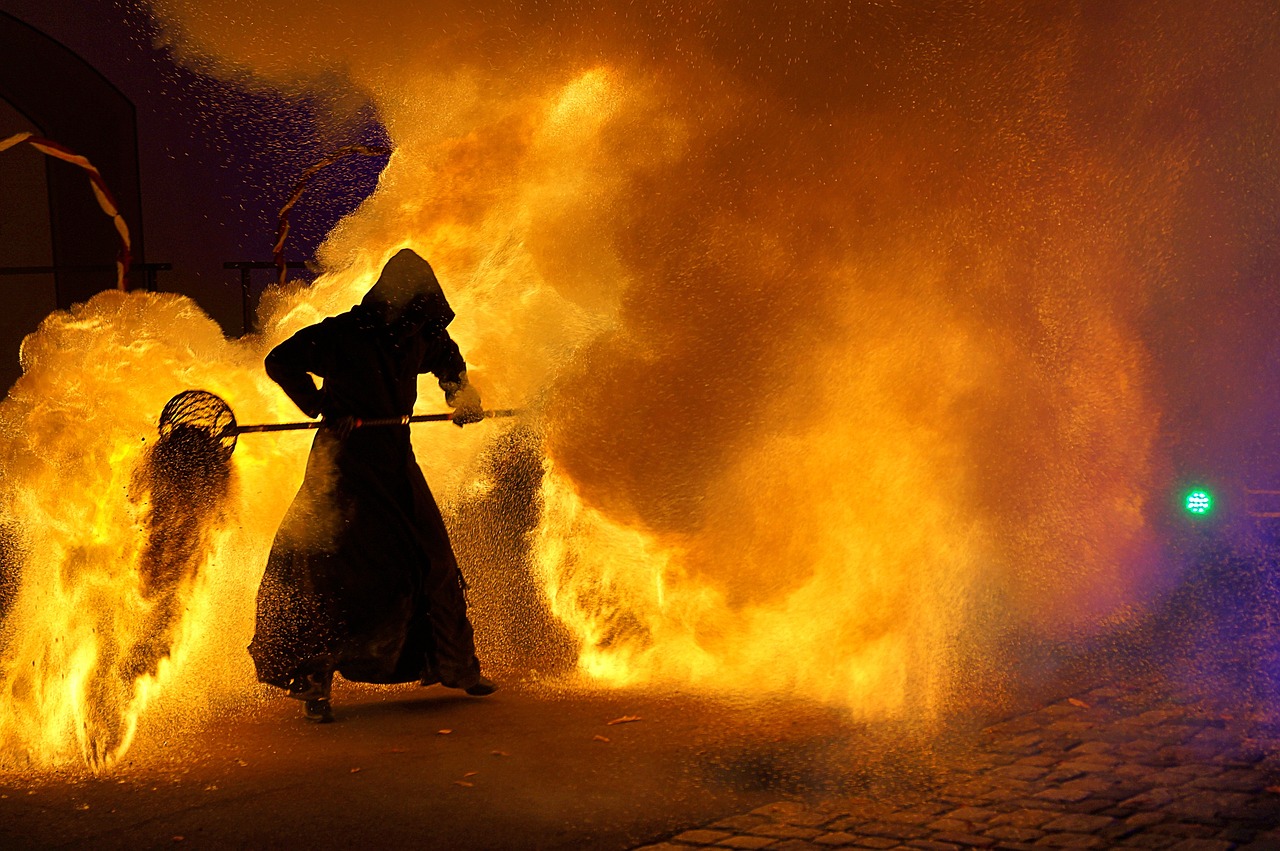
The Destructive Power of Fire
Fire, while often celebrated for its ability to create warmth and foster life, also possesses a formidable destructive power that cannot be ignored. In the philosophy of Heraclitus, fire is not merely a source of light; it is a relentless force that consumes and transforms everything in its path. This duality is what makes fire such a compelling metaphor for understanding the nature of existence. Just as a wildfire can sweep through a forest, leaving nothing but ashes in its wake, the destructive aspect of fire symbolizes the inevitable chaos and conflict that permeates our lives.
In the context of Heraclitus's philosophy, the destructive power of fire serves as a reminder of the transient nature of life. Everything we hold dear can be reduced to ashes in an instant, illustrating the idea that nothing is permanent. This perspective encourages us to embrace change rather than resist it, as the destruction wrought by fire often paves the way for new beginnings. Just as a forest regenerates after a fire, life itself is a series of cycles, where destruction and creation are inextricably linked.
Moreover, the destructive nature of fire can be seen in various aspects of human experience. Consider the following:
- Emotional Turmoil: Just as fire can consume physical matter, intense emotions can engulf us, leading to personal crises that feel all-consuming.
- Societal Conflict: On a larger scale, the destructive power of fire is mirrored in wars and conflicts that devastate communities, forcing individuals to confront the chaos of their reality.
- Natural Disasters: Wildfires, while a natural phenomenon, remind us of nature's fury and the fragility of human constructs in the face of such overwhelming force.
Heraclitus believed that this destructive aspect of fire is essential for understanding the interconnectedness of existence. Just as fire clears the old to make way for the new, the conflicts and struggles we face often lead to growth and transformation. It is through the ashes of our challenges that we can rise, much like the mythical phoenix, symbolizing rebirth and renewal.
In summary, the destructive power of fire in Heraclitus's philosophy serves as a profound metaphor for the challenges we encounter in life. It compels us to acknowledge that destruction is not merely an end, but also a necessary component of the cycle of existence. By embracing this truth, we can learn to navigate the flames of life with resilience and grace.
- What does Heraclitus mean by "everything flows"? Heraclitus emphasizes the idea that change is the only constant in life, and nothing remains the same.
- How does fire symbolize change in Heraclitus's philosophy? Fire represents both destruction and creation, illustrating the dual nature of existence and the cycles of life.
- Why is the concept of opposites important in Heraclitus's thought? He believed that opposites are interconnected and necessary for achieving harmony in the universe.
- What is the significance of Logos in Heraclitus's philosophy? Logos represents the rational principle that governs the cosmos, helping to explain the unity of change.
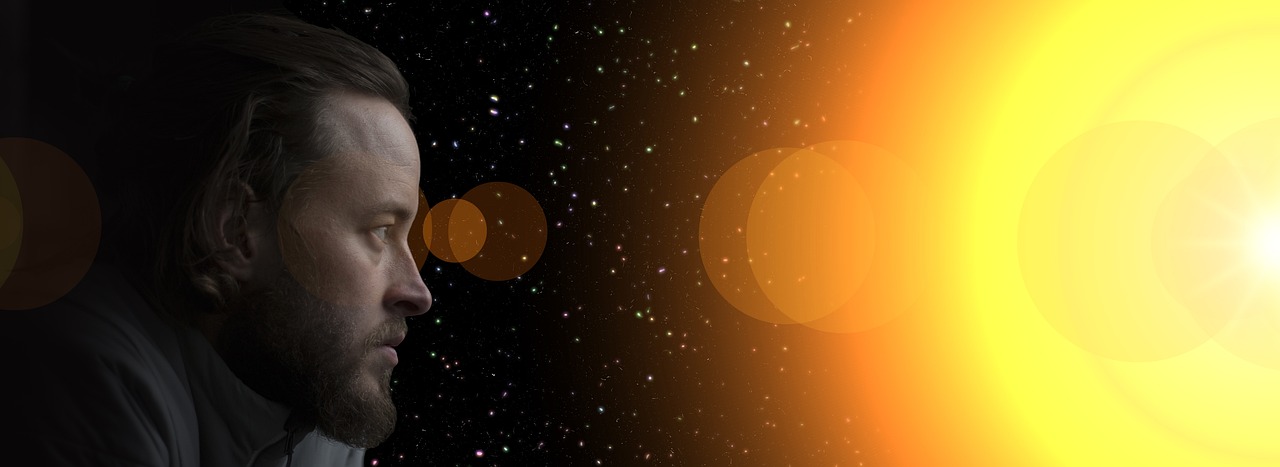
The Unity of Opposites
Heraclitus, a profound thinker of ancient Greece, held a captivating view of the universe that revolves around the idea of unity in opposites. He famously declared, “Strife is justice,” which suggests that conflict is not merely a source of chaos but rather a fundamental aspect of harmony. Imagine a world where light and darkness coexist, where joy and sorrow dance together in the grand tapestry of life. This is precisely the essence of Heraclitus's philosophy: opposites are not just opposing forces; they are interconnected elements that contribute to the balance of existence.
To truly grasp this concept, consider the fundamental dualities that permeate our lives. Day and night, hot and cold, life and death—each pair represents opposing forces that are, paradoxically, dependent on one another. Without darkness, how would we appreciate light? Without the chill of winter, can we fully embrace the warmth of summer? Heraclitus believed that these contradictions are essential for the cosmos to function harmoniously. In his view, opposites are not enemies but partners in the dance of existence.
Moreover, this unity of opposites extends beyond mere philosophical musings; it has practical implications for our understanding of the world. In nature, we observe how opposing forces work together to create balance. For instance, consider the ocean's waves: they crash against the shore with tremendous force, yet they also recede, allowing for the gentle caress of the tide. This cyclical pattern of ebb and flow illustrates how conflict and resolution are intertwined, echoing Heraclitus’s assertion that struggle leads to growth.
In a more abstract sense, Heraclitus's ideas can be applied to human experiences and relationships. Think about the dynamics in your own life. Moments of conflict often lead to deeper understanding and connection. When we face challenges, we are compelled to adapt and grow, much like a tree bending in the wind. This resilience is a testament to the unity of opposites at work, where adversity fosters strength, and pain can lead to profound joy. Heraclitus encourages us to embrace these contradictions, as they are vital for our personal evolution.
In summary, the unity of opposites is a cornerstone of Heraclitus's philosophy, revealing the intricate relationships that define our reality. By recognizing and accepting the interplay between opposing forces, we can cultivate a deeper appreciation for the complexity of life. Just as fire transforms substances through both destruction and creation, so too do the conflicts and resolutions in our lives shape our identities and experiences. Heraclitus invites us to see the beauty in this duality, reminding us that harmony often arises from the most unexpected places.
- What does Heraclitus mean by "unity of opposites"?
Heraclitus suggests that opposing forces are interconnected and necessary for harmony in the universe. They work together to create balance. - How can conflict lead to growth?
Conflict often challenges us to adapt and evolve, leading to personal growth and deeper understanding in relationships. - Why is fire significant in Heraclitus's philosophy?
Fire symbolizes transformation, representing both destruction and creation, which aligns with the concept of unity in opposites.

The Nature of Reality
Heraclitus's view of reality is nothing short of revolutionary, challenging the static perceptions that many hold about existence. He famously declared that "you cannot step into the same river twice," a profound statement that encapsulates his belief that reality is in a constant state of flux. This idea compels us to reconsider our understanding of permanence and stability. In a world where everything is in motion, the notion of a fixed reality becomes an illusion. Just think about it: the very fabric of our lives is woven with threads of change, making every moment unique and transient.
Heraclitus invites us to embrace the uncertainty of life, suggesting that the only constant is change itself. This perspective can be both liberating and daunting. On one hand, it encourages us to adapt and grow; on the other, it can lead to a sense of existential anxiety. Imagine trying to hold onto a handful of sand as it slips through your fingers—this is akin to our attempts to grasp a reality that is perpetually shifting. The challenge lies in recognizing that while we may desire stability, it is the very act of change that defines our experiences and shapes our identities.
Moreover, Heraclitus emphasizes that human perception often misrepresents reality. We tend to cling to moments, memories, and experiences, viewing them as fixed points in time. However, these are merely snapshots in a vast, ever-evolving landscape. To illustrate this, consider the following:
| Perception | Reality |
|---|---|
| Static | Dynamic |
| Fixed moments | Continuous flow |
| Illusions of permanence | Endless change |
In this table, we can see the stark contrast between how we perceive reality and how it truly exists. This misalignment can lead to a disconnect between our experiences and the actual nature of the world around us. Heraclitus encourages us to look beyond our immediate perceptions and to recognize the underlying currents that drive existence.
At the heart of Heraclitus's philosophy is the concept of the Logos, which he describes as the rational principle that governs the cosmos. This idea suggests that while change is constant, there is an underlying order to the chaos. The Logos serves as a unifying force, connecting the myriad changes we experience in life. It implies that even amidst the flux, there is a deeper logic at play, guiding the transformation of one state into another.
In essence, Heraclitus's insights into the nature of reality compel us to confront the uncomfortable truth that nothing remains the same. Embracing this fluidity can lead to a richer understanding of life, encouraging us to be more present and engaged in each moment. Instead of resisting change, we can learn to dance with it, finding beauty in the ebb and flow of existence.
- What is the main idea of Heraclitus's philosophy? Heraclitus believed that change is the fundamental essence of the universe, famously stating that everything flows.
- How does fire relate to Heraclitus's ideas? Fire symbolizes transformation and the dynamic nature of reality, representing both destruction and creation.
- What is the Logos in Heraclitus's philosophy? The Logos is the rational principle that governs the cosmos, providing order amidst constant change.
- How can understanding flux impact our lives? Recognizing the nature of flux can help us adapt to change, reducing anxiety and enhancing our appreciation for the present moment.

Perception vs. Reality
Heraclitus posited that human perception often misrepresents reality, creating a fascinating dichotomy between what we see and what truly exists. Imagine walking through a forest; the vibrant colors of the leaves and the crisp sound of twigs snapping underfoot create a vivid image of stability and permanence. However, beneath this surface beauty lies a world in constant flux, where leaves fall, trees grow, and ecosystems evolve. This analogy captures the essence of Heraclitus's philosophy, highlighting how our senses can deceive us into believing in a static reality.
To understand this concept better, let’s consider a few key points:
- Illusion of Stability: We often cling to the idea that things remain unchanged. For instance, a mountain may appear immovable, yet it is continuously reshaped by weather and geological processes.
- Dynamic Nature of Existence: Everything around us is in a state of becoming. Just as a river flows, so does life; it is never the same from one moment to the next.
- Emotional Perception: Our feelings can cloud our judgment, leading us to perceive situations differently than they are. This emotional lens can distort our understanding of reality.
Heraclitus believed that this gap between perception and reality is crucial for grasping the true nature of existence. He argued that while we may perceive stability, the essence of life is change. This perspective encourages us to embrace uncertainty and adaptability, recognizing that the only constant in life is change itself. Just as a kaleidoscope presents a new pattern with every turn, reality morphs with every passing moment, inviting us to engage with it more deeply.
Furthermore, the philosopher introduced the idea of Logos, a rational principle that governs the cosmos. This concept serves as a bridge between perception and reality, suggesting that while our senses may deceive us, there exists an underlying order to the chaos. The Logos provides a framework for understanding how change operates within the universe, emphasizing that reality is not random but rather a complex interplay of forces.
In conclusion, the distinction between perception and reality is a central theme in Heraclitus's philosophy. By recognizing that our perceptions can be misleading, we can cultivate a deeper awareness of the ever-changing nature of existence. This understanding not only enriches our philosophical inquiry but also enhances our everyday experiences, allowing us to navigate life with a sense of curiosity and openness.
- What does Heraclitus mean by "everything flows"? Heraclitus suggests that change is the only constant in life, and nothing remains the same.
- How does fire symbolize change in Heraclitus's philosophy? Fire represents transformation, embodying both creation and destruction, illustrating the duality of existence.
- What is the significance of the Logos? The Logos is the rational principle that governs the cosmos, providing a framework for understanding the unity of change.

The Logos
Heraclitus's concept of Logos is a cornerstone of his philosophical thought, representing the underlying order and rational principle that governs the cosmos. Imagine a vast, chaotic ocean where waves crash and foam erupts; amidst this tumult, there lies a current that guides the flow of water. This current is akin to the Logos, a force that brings coherence to the ever-changing nature of reality. Heraclitus believed that while everything is in a state of flux, the Logos serves as a constant, a guiding thread that weaves through the fabric of existence.
Logos is not merely a passive observer of change; instead, it actively shapes the dynamics of the universe. It's the reason why opposites can coexist and why conflict can lead to harmony. To illustrate this, consider the relationship between light and darkness. Without one, the other cannot exist; they are inextricably linked through the Logos. This interplay of opposites is essential for understanding the balance of the cosmos. Heraclitus famously stated, "War is the father of all things," highlighting how conflict, while seemingly destructive, can also lead to creation and transformation through the rational order of the Logos.
Furthermore, the Logos invites us to reflect on our own perceptions of reality. Often, we see the world through a lens of stability and permanence, but Heraclitus challenges us to recognize that what we perceive is merely a snapshot of a much larger, dynamic process. The Logos encourages us to look deeper, to understand that beneath the surface of our experiences lies a continuous flow of change. This realization can be both liberating and daunting. It urges us to embrace the uncertainty of life, knowing that within the chaos, there is a rational structure guiding our existence.
To better understand the significance of the Logos in Heraclitus's philosophy, consider the following key points:
- Unity of Opposites: The Logos reveals how opposing forces are interconnected and necessary for the harmony of the cosmos.
- Rational Order: It represents the rational principle that governs change, ensuring that chaos does not spiral into disorder.
- Perception of Reality: The Logos prompts us to question our perceptions and recognize the deeper currents of change that shape our lives.
In conclusion, the Logos is a profound concept that encapsulates Heraclitus's understanding of the universe. It is a reminder that while we may be swept away by the tides of change, there exists a rational order that guides us through the chaos. By embracing the teachings of Heraclitus, we can cultivate a deeper appreciation for the fluid nature of reality and the intricate dance of opposites that define our existence.
- What does Logos mean in Heraclitus's philosophy? Logos refers to the rational principle that underlies and governs the cosmos, providing order amidst the constant change.
- How does Heraclitus view change? Heraclitus famously believed that everything is in a state of flux, emphasizing that change is the only constant in life.
- What is the significance of opposites in Heraclitus's thought? He posited that opposites are interconnected and necessary for harmony, illustrating how conflict can lead to balance and unity.
Frequently Asked Questions
- What is the main idea behind Heraclitus's philosophy?
Heraclitus's philosophy revolves around the concept of flux, which suggests that everything is in a constant state of change. He famously stated that "everything flows," highlighting the dynamic nature of reality and the inevitability of transformation in the universe.
- Why is fire significant in Heraclitus's thought?
Fire serves as a central symbol in Heraclitus's philosophy, representing both destruction and creation. It embodies the dual nature of existence, illustrating how change can lead to both new beginnings and endings. Fire is a metaphor for the ongoing cycle of life, emphasizing transformation as a fundamental aspect of reality.
- How does Heraclitus view the relationship between opposites?
Heraclitus believed that opposites are interconnected and essential for achieving harmony in the cosmos. He argued that conflict and contrast are not only inevitable but necessary for balance, suggesting that without opposites, unity and existence would not be possible.
- What does Heraclitus mean by the 'Logos'?
The 'Logos' in Heraclitus's philosophy represents the rational principle that governs the cosmos. It signifies the underlying order and unity amidst the constant change, suggesting that there is a coherent reason behind the flux of reality, even if it often appears chaotic to human perception.
- How does Heraclitus's view challenge traditional perceptions of reality?
Heraclitus challenges the notion of permanence by asserting that reality is ever-changing. He posits that human perception often misrepresents the true nature of existence, leading people to believe in stability where there is none. This perspective encourages a deeper understanding of the world as a dynamic interplay of forces rather than a static entity.


